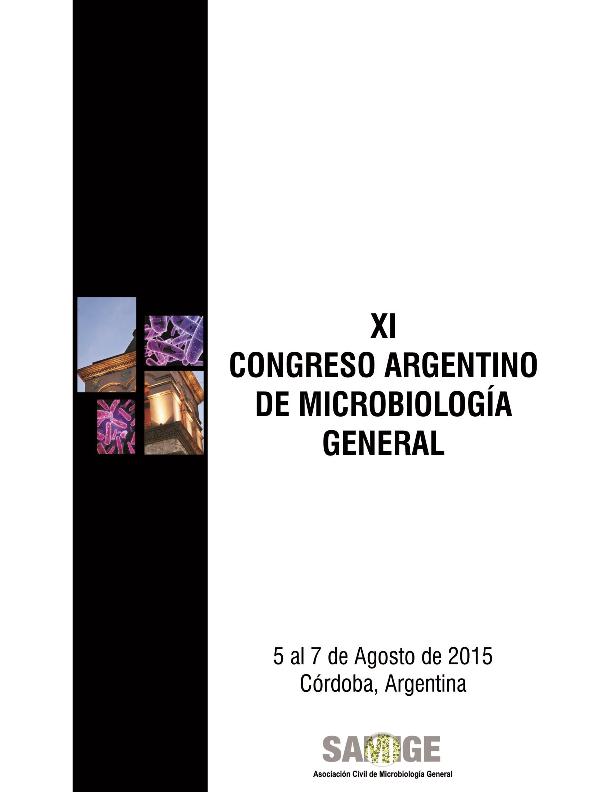Mostrar el registro sencillo del ítem
dc.contributor.author
Fernández, Ana Belén
dc.contributor.author
Rasuk, Maria Cecilia

dc.contributor.author
Kurth, Daniel German

dc.contributor.author
Contreras, M.
dc.contributor.author
Novoa, F.
dc.contributor.author
Poire, D.
dc.contributor.author
Farias, Maria Eugenia

dc.date.available
2023-04-24T14:31:48Z
dc.date.issued
2015
dc.identifier.citation
Analysing bacterial communities from microbial mats and sediments located in the Atacama desert; XI Congreso Argentino de Microbiología General ; Córdoba; Argentina; 2015; 1-2
dc.identifier.uri
http://hdl.handle.net/11336/195145
dc.description.abstract
The Atacama Desert has more than 100 basins with interior drainage and most of them contain salt flats. These ecosystemshave extreme environmental conditions that allow the development of unique microbial communities. The objetctive of this wasto study the bacterial diversity using independent culture tools of microbial mats and sediments from salt flats in the AtacamaDesert. Some physicochemical conditions of the water surrounding these samples were analysed to discover if anyphysicochemical characteristic could be influencing in its taxonomic composition. Five samples were collected, three of themwere microbial mats and two were sediments. The mat samples were taken from Laguna Llamara (samples named LL1 andLL2) and Laguna Cejar (Cej). Sediments were taken from Laguna Jachucoposa (Cop) and Laguna Pujsa (Puj) where microbialmats are not present. Total metagenomic DNA extraction was performed on each sample and the V4 hypervariable region of thebacterial 16S rRNA gene was amplified by pyrosequencing using the Ribosomal Database Project (RDP)-suggested universalprimers. Diversity of the microbial community was assessed using the QIIME software package. Lakes that harbor microbialmats have a higher salinity and a lower dissolved oxygen concentration and proportion of organic matter and total phosphorousthan lakes where mats are absent. All the samples have important concentrations of arsenic, with an extremely high amount inPuj. Proteobacteria and/or Bacteroidetes are the major phyla represented in all samples. Also, other phyla as Spirochaetes,Chloroflexi or Verrucomicrobia are found. However, cyanobacterial sequences are only observed in LL2 and Puj. On the otherhand, we have found a higher diversity in sediment than in mat samples. The sediments samples contain phyla not observed inmat samples. 16S rRNA gene sequences classified within Actinobacteria and Gracilibacteria are only found in Puj and related toTenericutes, Gemmatimonadetes and Acidobacteria are only observed in Cop. Finally, an important fraction of the sequencescould not be classified at phylum level. The high diversity found in sediment samples may be explained by the physicochemicalconditions in the environment. For example, they have a lower conductivity than mat samples. It is known hypersalineenvironments have a low diversity, where halophilic microorganisms are able to survive to these extreme conditions becausethey have specific strategies to balance the osmotic pressure. Besides, we found a low proportion or absence of Cyanobacteriain the ecosystems studied, suggesting the possibility that other groups may be playing an essential role as primary producers inthese extreme environments. Additionally, the large proportion of 16S rRNA gene sequences that could not be affiliated to anyknown bacterial phyla suggesting that in these ecosystems there are potential novel representatives of bacterial phyla not yetdescribed.
dc.format
application/pdf
dc.language.iso
eng
dc.publisher
Sociedad Argentina de Microbiología General
dc.rights
info:eu-repo/semantics/openAccess
dc.rights.uri
https://creativecommons.org/licenses/by-nc-sa/2.5/ar/
dc.subject
MICROBIAL DIVERSITY
dc.subject
ATACAMA DESERT
dc.subject
MICROBIAL MATS
dc.subject
SEDIMENTS
dc.subject
HYPERSALINE LAKES
dc.subject.classification
Biología Celular, Microbiología

dc.subject.classification
Ciencias Biológicas

dc.subject.classification
CIENCIAS NATURALES Y EXACTAS

dc.title
Analysing bacterial communities from microbial mats and sediments located in the Atacama desert
dc.type
info:eu-repo/semantics/publishedVersion
dc.type
info:eu-repo/semantics/conferenceObject
dc.type
info:ar-repo/semantics/documento de conferencia
dc.date.updated
2023-02-27T15:58:30Z
dc.journal.pagination
1-2
dc.journal.pais
Argentina

dc.journal.ciudad
Córdoba
dc.description.fil
Fil: Fernández, Ana Belén. Consejo Nacional de Investigaciones Científicas y Técnicas. Centro Científico Tecnológico Conicet - Tucumán. Planta Piloto de Procesos Industriales Microbiológicos; Argentina
dc.description.fil
Fil: Rasuk, Maria Cecilia. Consejo Nacional de Investigaciones Científicas y Técnicas. Centro Científico Tecnológico Conicet - Tucumán. Planta Piloto de Procesos Industriales Microbiológicos; Argentina
dc.description.fil
Fil: Kurth, Daniel German. Consejo Nacional de Investigaciones Científicas y Técnicas. Centro Científico Tecnológico Conicet - Tucumán. Planta Piloto de Procesos Industriales Microbiológicos; Argentina
dc.description.fil
Fil: Contreras, M.. No especifíca;
dc.description.fil
Fil: Novoa, F.. No especifíca;
dc.description.fil
Fil: Poire, D.. Consejo Nacional de Investigaciones Científicas y Técnicas. Centro Científico Tecnológico Conicet - La Plata. Centro de Investigaciones Geológicas. Universidad Nacional de La Plata. Facultad de Ciencias Naturales y Museo. Centro de Investigaciones Geológicas; Argentina
dc.description.fil
Fil: Farias, Maria Eugenia. Consejo Nacional de Investigaciones Científicas y Técnicas. Centro Científico Tecnológico Conicet - Tucumán. Planta Piloto de Procesos Industriales Microbiológicos; Argentina
dc.relation.alternativeid
info:eu-repo/semantics/altIdentifier/url/http://www.samige.org.ar/doc/2015/Libro%20de%20Resumenes%20FINAL.pdf
dc.conicet.rol
Autor

dc.conicet.rol
Autor

dc.conicet.rol
Autor

dc.conicet.rol
Autor

dc.conicet.rol
Autor

dc.conicet.rol
Autor

dc.conicet.rol
Autor

dc.coverage
Nacional
dc.type.subtype
Congreso
dc.description.nombreEvento
XI Congreso Argentino de Microbiología General
dc.date.evento
2015-08-05
dc.description.ciudadEvento
Córdoba
dc.description.paisEvento
Argentina

dc.type.publicacion
Book
dc.description.institucionOrganizadora
Sociedad Argentina de Microbiología General
dc.source.libro
Libro de Resumenes: XI Congreso Argentino de Microbiología General
dc.date.eventoHasta
2015-08-07
dc.type
Congreso
Archivos asociados
